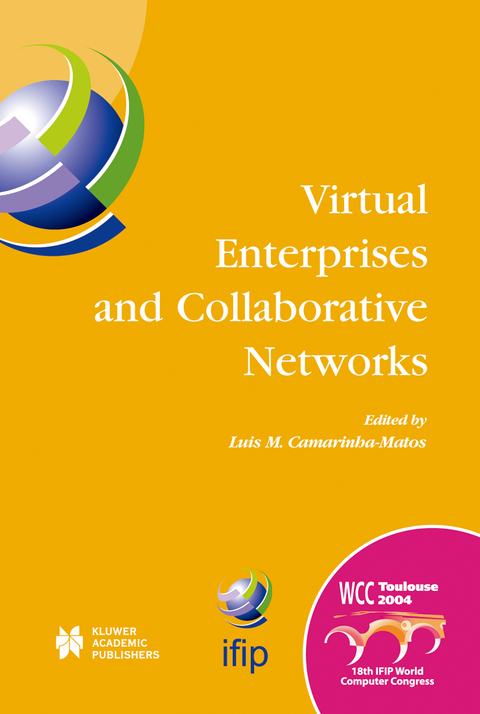
Virtual Enterprises and Collaborative Networks
Springer-Verlag New York Inc.
978-1-4020-8138-5 (ISBN)
Collaborative Network Organizations (CNO) corresponds to a very active and steadily growing area. For instance, Virtual enterprises/Virtual Organizations (PVC) suggest new ways of work and put the emphasis on collaborative networks of human actors.
Further to these main lines, other collaborative forms and patterns of collaborative behavior are emerging, not only in industry, but also in service sector, as well as governmental and non-government social organizations, e.g. the collaborative networks for rescue tasks in disaster situations, time bank organizations, etc.
The concept of breeding environment is now understood as a fundamental entity to enable dynamic collaborative organizations.
Research Trends in Collaborative Networks.- The Emerging Discipline of Collaborative Networks.- An Outlook of Future Research Needs on Networked Organizations.- Modeling Enterprise Networks.- A Modeling Approach for Designing Value Chain of VE.- Role Based and Processes Based Modelling Approach for Organization Network.- Odamy Extending B2B Integration Technology Architecture.- Modeling Methodologies for Collaborative Networks.- The Typed Domain - a Recipe for Creating Virtual Enterprises.- Introducing Time Horizons to Enterprise Networking Architecture.- Towards a Meta-Methodology for Collaborative Networked Organisations.- Distributed Business Processes.- Harmonising Business Processes of Collaborative Networked Organisations Using Process Modelling.- IDR: A Proposal for Managing Inter-Organizational Business Processes by Using Web-Services Oriented Architectures.- Integration of a Contract Framework in BP Models.- Multi-Agent Models in Collaborative Networks.- A Multi-Agent Model Integrating Inventory and Routing Processes.- An Operational and Secure Mobile-Agent Based System for Business Process Reconstruction.- Software Agents as Legal Persons.- Knowledge Management in Networked Enterprises.- A Cybernetic Approach Towards Knowledge-Based Coordination of Dynamically Networked Enterprises.- Knowledge Exchange in a Supply Chain Context.- Inter-Organizational Knowledge Management. The Importance of Organizational and Environmental Context.- Ontology Handling in Collaborative Networks.- Ontology-Based Automatic Data Structure Generation for Collaborative Networks.- Ontology-Services Agent to Help in the Structural and Semantic Heterogeneity.- Enhancing Interoperability Through the Ontological Filtering System.- VE/VO Configuration.- Smart Configuration of Dynamic Virtual Enterprises.- Dynamic Configuration of Collaboration in Networked Organisations.- Intelligent Supply Chain Planning in Virtual Enterprises.- Negotiation and Contract Management.- Enterprise Negotiation Algorithm with Walrasian Virtual Market.- Electronic Contracting in the E-Engineering HUB.- Integrating Procurement, Production Planning, and Inventory Management Processes Through Negotiation Information.- VE / VO Management.- Challenges in the Management of Virtual Organizations.- A Comparison of Supply Chain Management Policies.- A Business Model for Managing the Virtual Enterprise.- Management Issues in CN.- Promoting Trading Partner Trust in B2B E-Commerce Through the Use of Service Level Agreements and the Establishment of Support Centres.- Why Management in System and Information Technology.- The Formation and Dissolution of Organizational Networks: A Knowledge Management Perspective.- Collaborative Engineering.- The Mskin CO-Engineering Net.- Collaborative Infrastructure for Distance-Spanning Concurrent Engineering.- Collaborative Engineering Communities in Shipbuilding.- Professional Virtual Communities.- Uncovering the Difference: Management of Collaboration in Communities of Practice and in Virtual Enterprises/Virtual Organisations.- Knowledge Based Virtual Communities for Mobile and Collaborative Work in European Vehicle Repair Networks.- The Role of Virtual Communities in the English Premier Football League.- Distributed Software Production and Support.- A Reference Model for Global Software Development.- Squads: Software Development and Maintenance on The Grid by Means of Mobile Virtual Organizations Using Adaptive Information Services.- SOCP2P: A Peer-to-Peer IPS Based SoC Design and Simulation Tool.- Networking Technologies for VO.- Novel Networking Technologies for Collaborative Networked Organizations.- The Evolution of Inter-Firm Relationships and Impact on Communication Needs.- A Grid-Enabled Security Framework for Collaborative Virtual Organisations.- Collaborative Spaces.- A Synchronous Collaboration Server for the Construction Industry - The End Users’ Experience in the Collaborator Project.- Web-Based Environment for Digital Electronics Test Tools.- Manufacturing Automation Network’s Cooperative E-Space.- Web Service Markets and Hubs.- Designing a Hub to Offer E-Engineering Brokerage Services for Virtual Enterprises.- P2P Infrastructure for Tourism Electronic Marketplace.- A Web Interface for Accessing Scheduling Methods in a Distributed Knowledge Base.- Innovation, Sustainability, and Readiness for Collaboration.- Approach for Implementing Non-Linear Distributed Innovation Management Methodologies In Collaborative Industrial Networks.- Exploring Sustainable Virtual Enterprises: Two Case Studies.- The Aricon VE Readiness Assessment Approach in the New Product Development (NPD) Context.- Risk Management in Collaborative Networks.- Risk-Management of Product Development in Non-Hierarchical Regional Production Networks.- Risk Management in Distributed Software Development: A Process Integration Proposali.- Management of IT-Risks in the Context of Inter-Organisational Knowledge Management.- Case Studies in VO / CN.- A Case Study of Governance in Public Sector ‘Virtual Organizations’: The Emergence of Children’S Trusts.- Conferences as Virtual Enterprises.- Web Services for the Footwear Sector in a Networked Context.- Supporting a Public Health Care Virtual Organization by Knowledge Technologies.- Education on VO and Knowledge Sharing.- Education on Virtual Organizations: An Experience at UNL.- A CaseStudy of vo Education in Costa Rica.- Mental Models as Enablers of Knowledge Sharing and Decision-Making in the Design Ofcollaborative Networked Environments.
| Reihe/Serie | IFIP International Federation for Information Processing ; 149 |
|---|---|
| Zusatzinfo | XIV, 610 p. |
| Verlagsort | New York, NY |
| Sprache | englisch |
| Maße | 155 x 235 mm |
| Themenwelt | Mathematik / Informatik ► Informatik ► Netzwerke |
| Informatik ► Weitere Themen ► Hardware | |
| Wirtschaft ► Betriebswirtschaft / Management ► Unternehmensführung / Management | |
| ISBN-10 | 1-4020-8138-3 / 1402081383 |
| ISBN-13 | 978-1-4020-8138-5 / 9781402081385 |
| Zustand | Neuware |
| Haben Sie eine Frage zum Produkt? |
aus dem Bereich


